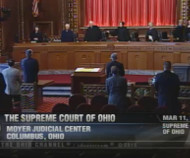2/12/2016
Ohio Supreme Court Delays Suit Against Illegal Photo TicketsTechnical ruling from Ohio Supreme Court has trial judge determine whether paying a speed camera ticket precludes a later challenge.

A divided Ohio Supreme Court ruled on Tuesday that the Court of Appeals jumped the gun when it allowed a class action case to proceed against the speed camera program in Cleveland. In the fourteen-page technical ruling, the justices said the appellate court decided a matter that had not been fully considered at the trial level and sent it back for further proceedings. The move will delay a case that has bounced around the courts for the past six years.
In 2009, Janine Lycan filed a class action lawsuit over the $100 ticket she received in the mail from Affiliated Computer Services (ACS, now Xerox). At the time, Cleveland's photo ticketing ordinance only had provisions for sending tickets to the "owner" of a vehicle, and Lycan's car was leased. The suit seeks refunds for all owners of leased vehicles who were improperly ticketed.
Cleveland does not want to give the money back. It argues that a citation payment is "voluntary" and thus cannot be contested in court. Under the doctrine of "res judicata," which refers to matters that have already been decided, the city insists that the ticket may not be challenged. The justices found the three-judge appellate panel lacked the authority to shoot down Cleveland's argument.
"We conclude that the Eighth District improperly ruled on the question of res judicata, because the trial court did not decide that question in a final, appealable order," Justice Judith L. French wrote for the majority. "The parties do not dispute that the order that Cleveland appeals here -- the trial court's February 26, 2013 class-certification order -- is a final, appealable order. That order, however, addresses only whether plaintiffs met the seven requirements to maintain a class action. It contains no findings or discussion pertaining to res judicata or the preclusive effect of Cleveland's administrative process. Therefore, it provides no basis for reviewing the res judicata question in this appeal."
The high court did affirm that the class action would be certified to proceed as long as the voluntary payment argument is properly handled. Justice Sharon L. Kennedy blasted her colleagues for inventing a requirement for a trial judge to "recite talismanic words" before certifying a class action. She said it was obvious that the trial judge considered and rejected the city's arguments when it certified the anti-camera suit.
Cleveland no longer operates red light cameras or speed cameras, but the program has left the city with massive legal troubles. Residents banded together in 2014 to banish the cameras, securing 78 percent of the vote at the ballot box. Federal investigators have already uncovered proof of bribery in Columbus and Cincinnati related to the photo ticketing contract with Redflex. While Cleveland chose Xerox instead of Redflex, Xerox is suing the city over the deal. Recent attempts at mediation have failed and the case is set to enter the discovery phase in June.


